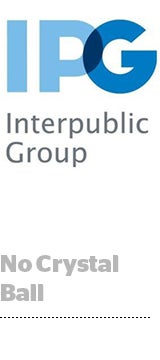Here’s today’s AdExchanger.com news round-up… Want it by email? Sign up here.
Taking A Hit
The ongoing pandemic is still throwing IPG for a loop as the holdco rethinks its structure for the year ahead. IPG reported net sales of $8 billion in 2020, a 6.5% decrease compared with the previous year, The Wall Street Journal reports. Organic net revenue minus acquisitions and disposals fell 4.8% for the year. In Q4, net sales decreased 6.1% to $2.28 billion YoY. Organic revenue decreased 5.4% in the quarter, missing analyst expectations of 4.7%. IPG said it expects to return to organic growth over the course of 2021, although newly-appointed CEO Philippe Krakowsky warned that the company’s visibility is still challenged. Marketers aren’t pulling back on their spending as much as they had during the earlier phases of the pandemic, which is good. But at the same time, many advertisers are reevaluating their strategies and remain cautious, making it difficult for IPG to predict how their clients will spend in the year ahead. Although IPG is “beginning to see the light at the end of the tunnel,” Krakowsky said, the timeline for recovery is fuzzy. IPG has been restructuring in order to reduce expenses in the long term. Global headcount was roughly 50,200 at the end of the year, down 7.6% from the year before.
By The Numbers
Facebook’s fight against harmful content on its platform continues. On Thursday, it shared results from its latest moderation transparency report covering October through December 2020, a period that included the presidential election. On a press call with reporters, Facebook highlighted an uptick in its enforcement with a total of 6.3 million takedowns during Q4 2020. That’s an increase from 3.5 million in Q3 and up from 2.8 million in Q4 2019. According to Facebook, it’s expanded its capacity for human review and made improvements to the AI it uses to analyze comments, especially for non-English posts. Most of the takedowns on Facebook were related to harassment, hate speech, suicide and self-harm content, while over on Instagram, there was a significant jump in removals to do with bullying and self-harm. The Verge has more. In other news, Facebook helped the government identify rioters involved in the Jan. 6 attack on the US Capitol from photos shared on its platform. Read on. And in yet other news, AI isn’t magic. The New York Times reports that Instagram and Facebook’s automated intelligence systems have repeatedly denied ads placed by small businesses that make stylish clothing for people with disabilities.
On Display
Vox Media formally rolled out Forte, its first-party data solution in March 2020, just as the COVID-19 pandemic hit. But although the timing was less than fortuitous, Forte wound up having a very good year, Digiday reports. More than 100 brands used Forte in campaigns last year to drill into consumer interests and actions. By the end of 2020, Forte data was used to drive “nearly half” of Vox Media’s display ad revenue. That figure is expected to grow significantly this year, as brands and agencies familiarize themselves with alternatives to third-party cookies. But even with its strong start, Vox Media is in a race to prove that Forte can support multiple use cases and provide a backbone for consistent client spending. Thus far, for example, Forte has only been used to execute a small handful of second-party data projects.
Big Deal?
In what could’ve been its biggest deal ever, Microsoft recently considered snapping up Pinterest for $51 billion – twice as much as it spent to buy LinkedIn in 2016. According to the Financial Times, which first reported the news, the negotiations are not active and Pinterest has indicated in the past that it wants to remain independent. Microsoft’s acquisition strategy is focused on collecting a range of active online communities which can run on its cloud computing platform, Azure. Pinterest, which added a record 100 million-plus monthly active users last year, boomed during the pandemic as customers spent more and more time online. News of the purported deal sent Pinterest’s shares up 5% when the market opened on Thursday.
But Wait, There’s More!
LG, which just bought a majority stake in Alphonso, has selected newly Magnite-owned SpotX as its primary SSP [Adweek], while AB InBev named Epsilon as its data agency of record in the US. [Ad Age]
Basis by Centro is integrating with AdsWizz for programmatic audio advertising. [release]
Twitter is exploring the idea of allowing its users to receive tips or digital payments from their followers. [Business Insider]
CBS All Access will soon stop working on older Apple TV devices when it becomes Paramount Plus on March 4. [Yahoo! Finance]
Super Bowl ads missed the mark on diversity. [CampaignUS]
The EU’s lead data protection supervisor is calling for a ban on targeted advertising that relies on tracking an internet user’s digital activity. [TechCrunch]
A new North Dakota bill could force Apple to allow alternative app stores and payment systems. [The Verge]
AppsFlyer has announced a predictive analytics product for SKAdNetwork. [release]
Google’s own iOS apps were prompting users to run updates that don’t exist. Google blamed the issue on a bug. [The Verge]
You’re Hired!
R/GA has tapped Ashish Prashar, who joins from Publicis Sapient’s comms team, as the agency’s global CMO. [Ad Age]
Lori Tavoularis is Nexstar’s new CRO for its digital division. [release]
Martech company Sightly has hired former Deloitte Digital SVP of advertising Stefan Papp as its CTO. [release]
Indie digital marketing services group Incubeta has appointed Sally Laycock as its UK CEO. [MarTech Series]













